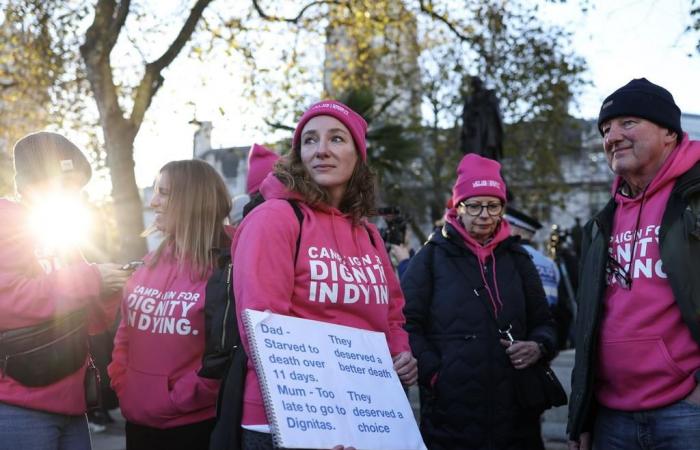Historic vote –
UK on track to legalize assisted dying
A majority of British MPs spoke out this Friday in favor of legalizing assisted suicide in England and Wales.
Published today at 8:41 p.m.
The Dignity in Dying association welcomed “a historic step towards better choice and better protection for dying people”.
KEYSTONE/EPA/NEIL HALL
Subscribe now and enjoy the audio playback feature.
BotTalk
British MPs approved this Friday at first reading the legalization of assisted dying for certain terminally ill patients, in a historic vote following an emotional debate.
The bill, which concerns England and Wales, mobilized parliamentarians across traditional political divisions. It will still have to go through several stages before its final adoption.
Five hours of debate
But nine years after the rejection of a previous text by the House of Commons, the deputies this time aligned themselves with 330 votes for (275 against) on the growing support of the British population for the legalization of assisted suicide, after almost five hours of debate.
Labor MP Kim Leadbeater, who proposed the bill, welcomed the bill, saying on the BBC that Parliament had risen “to its best today”, with a “very respectful” debate. During the examination of the text, she assured that it would give “choice, autonomy and dignity” to adults in the terminal phase of an illness, having only six months or less to live, while emphasizing that this right would be governed by “very strict criteria”.
At this point you will find additional external content. If you accept that cookies are placed by external providers and that personal data is thus transmitted to them, you must allow all cookies and display external content directly.
Allow cookiesMore info
Patients must be able to express an informed choice and take the substance causing their death themselves. Two doctors and a judge will have to agree.
Prime Minister Keir Starmer, who had not spoken until now, voted in favor of the text, as in 2015. He had not given voting instructions to his majority. According to a recent YouGov poll, the three Quarters of people in England and Wales support this change in law.
“A historic step”
Dozens of supporters and opponents of the text gathered this Friday in front of Parliament. At the end of the vote, the organization Dignity in Dying welcomed “a historic step towards better choice and better protection for dying people”. The Care Not Killing association, opposed to assisted suicide, said it was “disappointed”, while emphasizing an “extremely close” result.
Currently, assisted suicide is illegal and carries a penalty of 14 years in prison if aiding or abetting.
Testimonies of desperate gestures
During the debate, many deputies spoke, sometimes on the verge of tears, of the experience of a loved one to support their support or opposition to the text. Kim Leadbeater told the story of Norman, a man suffering from prostate cancer for 15 years who “shot himself in the head” when the pain became unbearable. The current law “is not clear and does not protect patients, families and health workers, which pushes people to desperate actions,” she added.
For several weeks, the prospect of the vote has raised an intense debate on ethical, religious but also financial foundations. Around thirty spiritual leaders had expressed their “deep concern”, worrying that fragile people felt a “duty to die” to relieve their loved ones.
“How can we guarantee that an elderly person in a retirement home, who has been given six months to live, will not say to himself: I am a burden (…) if I end my life now, will my family be able to save 25,000 to 55,000 pounds?” asked Richard Burgon, an independent MP.
Health system crisis
Rather than assistance in dying, many opponents have called for better funding for palliative care, while the public health system is going through a deep crisis.
Kim Leadbeater assured that this law contained “the strongest guarantees and protections in the world”, and had “nothing to do” with those of Canada or Belgium, with much broader criteria.
Several steps to come
The text must now be examined in committee, before being resubmitted for approval by both houses of the British Parliament. During these stages “we must answer all the questions that have been raised today”, citing palliative care, the rights of disabled people and the state of the health system, acknowledged Kim Leadbeater on the BBC.
Scotland, which has delegated powers in matters of health, must vote on its own bill in 2025. The Isle of Man is also examining a text, while the Channel Island of Jersey has validated the preparation of a law by 2027.
“Latest news”
Want to stay on top of the news? “Tribune de Genève” offers you two meetings per day, directly in your email box. So you don’t miss anything that’s happening in your canton, in Switzerland or around the world.
Other newsletters
Log in
AFP
Did you find an error? Please report it to us.
0 comments






